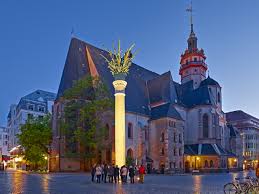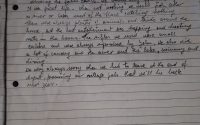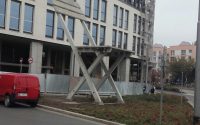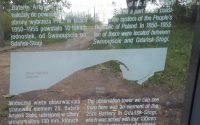And The Wall Comes Tumbling Down
In this week’s blog, I will be making reference to Pope John Paul II. This will be exclusively in relation to the political situation at the time and will make no reference or comment on the religious implications of his election or time as Pope.
Between 1978 and 1989, three events occur which will precipitate the end of the ‘Cold War’, the election of Karol Wojtyła as Pope, the ‘invasion of’ or ‘invitation into’ Afghanistan in 1978 by the USSR and the explosion of the nuclear reactor at Chernobyl in 1986.
Karol Wojtyła takes the name John Paul II. He is the first non-Italian Pope since 1530, just a few years after the Reformation officially began. His election will have implications beyond the Roman Catholic Church. There is a saying that for every two Poles, there are three newspapers and four political parties. Ironically for mainly Catholic Poland, Wojtyła’s election has far greater political significance, as it will afford Poland a degree of protection from threats of intervention from the Kremlin. In a few years, emboldened by having someone who is a world figure to be listened to, the Solidarity trade union is organised in 1980 in a Gdańsk shipyard and this unites the opposition to the Communist regime. Wojtyła himself is fully aware that, for his country, he is more a political leader than a religious one. My father recognised all of that and commented that Wojtyła would be a pragmatic political figure, given the Polish characteristic of hotheadedness fuelled on romanticism which, historically spilled over into failed uprisings against Russians, Prussians and Austrians.

Just a few months into John Paul II’s papacy, the USSR sends its military into Afghanistan. I remain completely neutral on this as from the point of view of the West it was an invasion, but the fact remains, that whatever you may think of Communist regimes, Afghanistan was a sovereign country, recognised as such by the international community and it invited the USSR to help it combat extensive rebel insurgency. If this is not enough of a dangerous situation in the region, in nearby Iran, the Shah, a key ally of the United States is overthrown and Iran designates itself an Islamic Republic. From key ally to enemy overnight, any opportunity the United States might have to monitor events in Afghanistan vanishes. In the 1980 United States Presidential election President Carter fails to be re-elected and Ronald Reagan, with a hardened attitude, is sworn in as President vowing to increase the United States nuclear capability as a deterrent against the USSR. Within a year, the situation in Poland becomes unsettled again and the Solidarity Trade Union is formed, an event which adds to the already volatile global situation.Solidarity is dedicated to winning better conditions and freedom and much less to do with introducing capitalism. In 1981, martial law is declared in Poland, and the government withdraws its recognition of Solidarity. My father reckoned that the USSR would have intervened had it not been for the Pope, but the price for Poland was repressive military rule. Meanwhile the domestic situation in the USSR itself becomes nervous as there are three heads of state between 1982-1985 and in the intervening years there is a failed assassination attempt, carried out by a proxy, on the Pope. Although there is no direct USSR involvement, the implication is that the Pope’s publicity is causing unrest in Poland. My father used to say that one day, certainly not in his or my lifetime, that the Communist system would, over time, gradually collapse and the ‘ Iron Curtain’ would disintegrate. The end when it does come is both dramatic and precipitous.
Historically, oppressed peoples usually rise up against their oppressors, but in the USSR, the Communist system rose up against itself. In 1986, after the death of President Konstantin Chernenko, Mikhail Gorbachev is elected leader of the USSR. The Russian military, still in Afghanistan is unable to quell rebel insurrection and domestically, consumers are becoming more scarce, as the USSR spends most of its budget trying to keep pace with the United States. However, there is a thaw when both USSR and USA edge towards a rapprochement. Gorbachev is more of a pragmatist than an ideologue and intends to be more open with the citizens. In a way he re-phrases the saying ‘those who are not with us are against us to ‘those who are not against us are with us. He encourages openness and is dedicated to reforming the economy away from rigid government diktat. The first test of this comes in 1986, with the explosion of the Chernobyl nuclear reactor in Ukraine. For a time the USSR government tries to cover the incident up, but comes clean and asks for help. Events elsewhere in eastern Europe, particularly in Poland are following the changes in the USSR. Solidarity Trade Union actually strengthens to such an extent that its membership soars to just under ten million out of a population of thirty seven million. The military government is at a dead end, without the implicit backing of the USSR and reaches an accommodation with Solidarity. A strange situation begins to develop. Eastern Europe is dissolving slowly into two rival camps of reformers and hardliners and ironically the USSR is joining Poland and Hungary in the camp of the reformers and putting Czechoslovakia, East Germany, Romania and Bulgaria in the hardline camp. The Evangelical Lutheran Church of St. Nikolas in Leipzig leads a huge protest of East Germans demanding change, a demand the regime cannot resist without the involvement of the USSR which has no intention of intervening.

And then on Friday 9th November 1989, my father is watching television,when programmes are interrupted to broadcast breaking news. Millions watch the Berlin Wall being torn down by demonstrators on both sides, while East German security forces stand and watch. My eldest son David, who was visiting my parents house that evening recalls my father shouting excitedly ‘My God would you all come and look at this’! I think at that point he realised that the road back to his homeland was free of barriers and another chapter was beginning in his search for answers about his family. World events often turn on sheer luck. In this case the catalyst was, I think, two men; Karol Wojytła and Mikhail Gorbachev.
End


